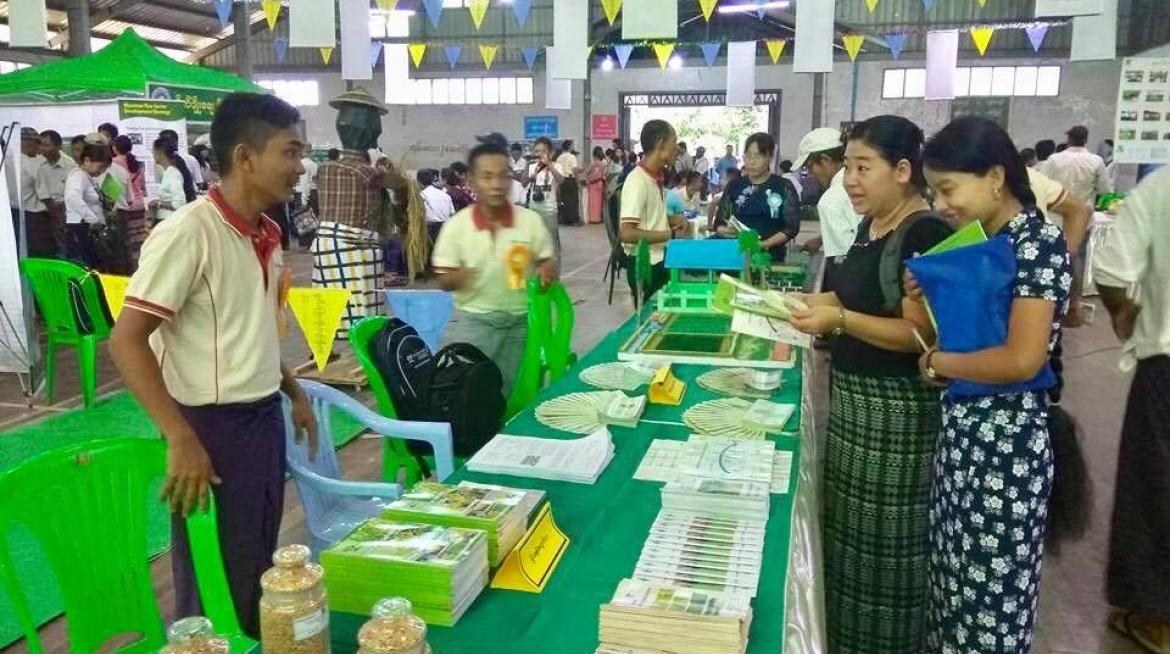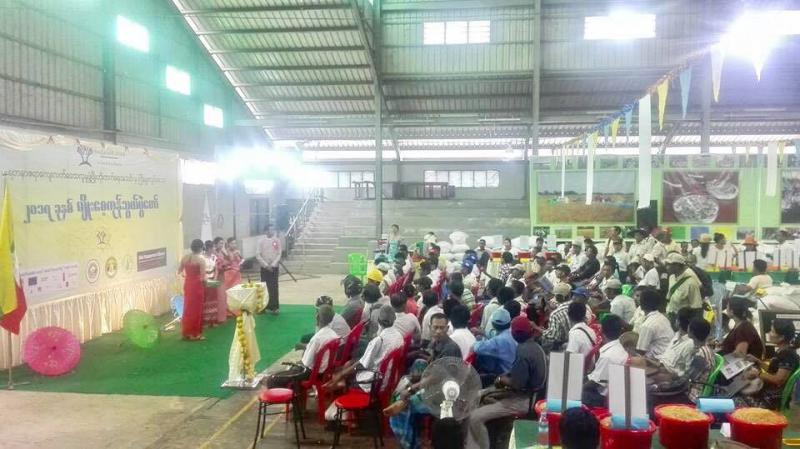
A two-day Seed Trade Fair 2017 was held last month in Bogale. The event was an opportunity for the trading of rice seed, creating space for the producer farmers and buyers to link together with government departments working in the seed sector.
The event was organised by Radanar Ayar Rural Development Association, one of local partners to LIFT, in cooperation with the Department of Agricultural Research (DAR), Department of Agriculture (DOA) of the Ministry of Agriculture, Livestock and Irrigation and other public and private partners.
The key objectives of the event were to:
- create incentives for active participation and cooperation among the farmers
- stimulate new mindsets about farming activities and to replace the traditional seed varieties with improved quality and high-yielding seeds, and
- create public and private partnerships
From the previous LIFT-funded SEED project, Radanar Ayar has learned that wider market linkages are very important for the seed growers for sustainability in the longer term. The seed demand within townships is high compared to the supply available seasonally. Although the project is working with seed growers in the seed production acres, gaps remain between demand and supply of rice seed. Therefore, with LIFT support the Integrated Agriculture and Rural Development (IARD) project is planning to conduct regional-level Seed Trade Fairs in order to close the gap in supply-demand linkages and create access to wider market linkages in the sector. This is the first time an event was organised by the LIFT-funded IARD project with the support of LIFT’s Delta programme’s implementing partners.
Deputy Director General, U Thant Lwin Oo from the Department of Agriculture Research in his welcome speech at the event, said: “Since 2009, Radanar Ayar and its partners started working for the seed sector development and supported farmers to access the quality seed in Delta.
“We cannot work alone for the sufficient supply on total seed demands and the local initiative brought up by Radanar Ayar and partners are very helpful for us. This type of event informs us about the farmers’ needs as well as helping us to gear up our scientific research side on quality seed production – recognising this is as very important input for the agricultural development,” he said.
Regional Director of the Department of Agriculture in Ayeyarwady Region, U Tun Aung Kyaw also acknowledged that this was an important event not only in the region but also around the country. He stressed that collaboration more with seed producers, farmers and private sector was needed to support seed sector development.
“We [the department] can’t manage 50 million acres of paddy land by ourselves to meet the demand of seed supplies and we acknowledge the effort of Radanar Ayar Rural Development Association for their commitment and support in the sector,” he said in his opening remarks.
A dialogue between farmers was also included as part of the event agenda. U San Thaung, a 48-year-old seed producer said: “This is very helpful for us to connect with the private sector and we can also have a chance to discuss with the respective line departments for what we need to improve the seed quality and how we can work closely with them.”
At the end of the fair, roughly 620 baskets of Certified Seed (CS) and 80 baskets of Registered Seed (RS) were sold out. The event drew the interest of seed buyers from the private sector, three government seed farms and ICRC.
Karen seed producer groups and private sector together with seed producer farmers also hosted a round table discussion after the opening ceremony. From the discussion, participants learned how they can work together with seed growers in terms of management, storage, the benefit of production, and the market opportunities.
IRRI, GRET, GreenWay mobile technology, Shwe Thee Hnan mobile technology showcased their products and activities at the event. Through the trade fair, farmers could also access fertilisers and seeds in time for the monsoon. Introducing the improved quality and high yielding seeds over traditional seeds in partnership with public and private sectors create a space for seed growers to produce the quality seed. The opportunity helped them to recognise the economic liability and empowered them to work with public and private partners in the whole chain of agricultural sector in Myanmar.
So far, the Seed Lab certified the quality seed of 1,500 baskets by the producer farmers under the IARD project. The project is expected to support 100 individual seed growers.
This article was contributed by Radanar Ayar and edited by LIFT.


